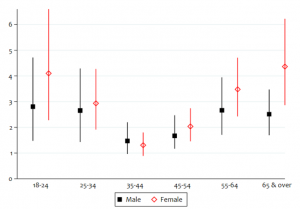Finite amount of human computing time: Difference between revisions
(Created page with "There are 8 billion people on earth, 1 billion of which go hungry everyday<ref>https://www.worldvision.com.au/global-issues/work-we-do/famine/why-are-so-many-people-in-the-wor...") |
No edit summary |
||
| (7 intermediate revisions by the same user not shown) | |||
| Line 1: | Line 1: | ||
There are 8 billion people on earth, 1 billion | [[File:Risk aversion.png|alt=Risk aversion|thumb|Risk aversion vs age]] | ||
'''There are 8 billion people on earth. Some 2.2 billion people around the world do not have safely managed drinking water services, 4.2 billion people do not have safely managed sanitation services, and 3 billion lack basic hand washing facilities<ref>https://www.who.int/news/item/18-06-2019-1-in-3-people-globally-do-not-have-access-to-safe-drinking-water-unicef-who</ref>. In addition, 1 billion go hungry everyday<ref>https://www.worldvision.com.au/global-issues/work-we-do/famine/why-are-so-many-people-in-the-world-hungry#:~:text=Almost%20821%20million%20people%20in,have%20access%20to%20enough%20food.</ref> and two billion people are affected by fragility, conflict or violence.<ref>https://www.icrc.org/en/document/global-trends-war-and-their-humanitarian-impacts-0</ref>''' Add to this indebted servitude and child raising, it a wonder how any human has the luxury to think let alone act on global issues. Those that do think, some participate however the vast majority of working age people, arguably those that could make the most difference are relatively risk averse. Younger people aged 18 to 24 exhibit a loss aversion coefficient somewhere between 3 and 4 as do people aged 65 and over. But people in the midst of their working lives (aged 35 to 54) tend to have much lower loss aversion, somewhere between 1 and 2. | |||
In regards to [[Maslow's hierarchy]] the vast majority of people on earth are not not meeting the ''Basic Needs'' rung of the pyramid, therefore the amount of relevant human computing time is extremely finite. | |||
=== References === | |||
Latest revision as of 06:29, 12 April 2022
There are 8 billion people on earth. Some 2.2 billion people around the world do not have safely managed drinking water services, 4.2 billion people do not have safely managed sanitation services, and 3 billion lack basic hand washing facilities[1]. In addition, 1 billion go hungry everyday[2] and two billion people are affected by fragility, conflict or violence.[3] Add to this indebted servitude and child raising, it a wonder how any human has the luxury to think let alone act on global issues. Those that do think, some participate however the vast majority of working age people, arguably those that could make the most difference are relatively risk averse. Younger people aged 18 to 24 exhibit a loss aversion coefficient somewhere between 3 and 4 as do people aged 65 and over. But people in the midst of their working lives (aged 35 to 54) tend to have much lower loss aversion, somewhere between 1 and 2.
In regards to Maslow's hierarchy the vast majority of people on earth are not not meeting the Basic Needs rung of the pyramid, therefore the amount of relevant human computing time is extremely finite.
References
- ↑ https://www.who.int/news/item/18-06-2019-1-in-3-people-globally-do-not-have-access-to-safe-drinking-water-unicef-who
- ↑ https://www.worldvision.com.au/global-issues/work-we-do/famine/why-are-so-many-people-in-the-world-hungry#:~:text=Almost%20821%20million%20people%20in,have%20access%20to%20enough%20food.
- ↑ https://www.icrc.org/en/document/global-trends-war-and-their-humanitarian-impacts-0
